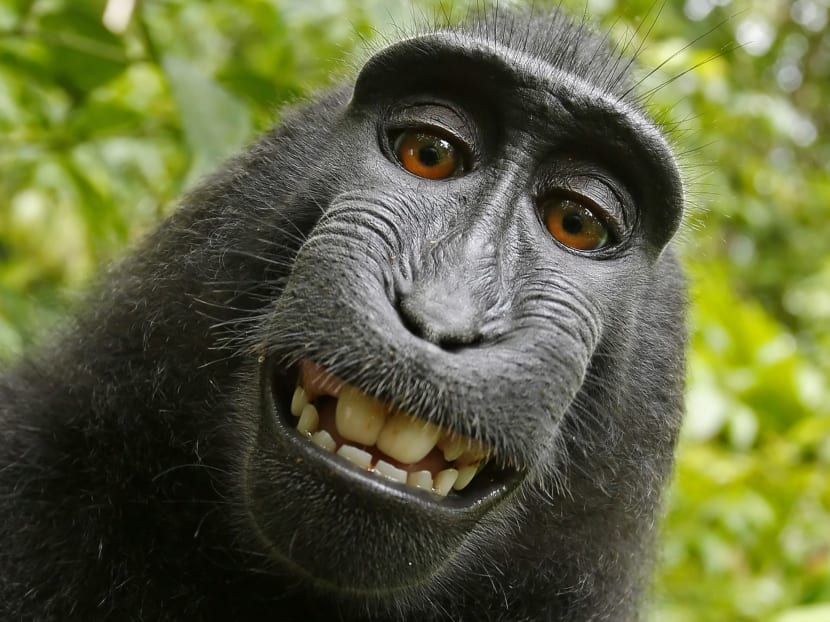Who owns a monkey selfie? Deal is struck in a novel lawsuit
JAKARTA — In 2011, Naruto, a curious six-year-old monkey in Indonesia, peered into a camera lens, grinned and pressed the shutter button on the unattended camera. Little did the endangered crested macaque know that he may have been providing for his future.

The selfie of a macaque monkey that led to a novel and lengthy lawsuit over whether the monkey owned the rights to it. Photo: David Slater/Court exhibit provided by PETA via AP
JAKARTA — In 2011, Naruto, a curious six-year-old monkey in Indonesia, peered into a camera lens, grinned and pressed the shutter button on the unattended camera. Little did the endangered crested macaque know that he may have been providing for his future.
The selfie of his bucktooth smile and wide amber eyes made Naruto an internet celebrity. But the widely shared image became embroiled in a novel and lengthy lawsuit over whether the monkey owned the rights to it.
Naruto lost the first round in federal court in California in 2016, but won a victory of sorts in a settlement this week for himself and his friends.
The camera’s owner, Mr David J. Slater, agreed to donate 25 per cent of future revenue of the images taken by the monkey to charitable organisations that protect Naruto, which lives in the Tangkoko Reserve on the Indonesian island of Sulawesi, and other crested macaques.
Lawyers for Mr Slater, a British photographer, and People for the Ethical Treatment of Animals (Peta), which sued Mr Slater on Naruto’s behalf, also asked the Ninth US Circuit Court of Appeals, which was hearing an appeal in the case, to drop the lawsuit and vacate a lower decision that found the monkey could not own the image’s copyright.
“Peta and David Slater agree that this case raises important, cutting-edge issues about expanding legal rights for animals, a goal that they both support, and they will continue their respective work to achieve this goal,” the groups said in a joint statement.
Mr Slater could not be reached for comment, and his lawyer declined to comment. Mr Jeff Kerr, the general counsel for Peta, said the group was pleased that Naruto would benefit from the images.
“The dire need of Naruto is what fully underpins why we pursued this lawsuit to begin with,” Mr Kerr said in an interview. “We wanted every bit of all of the proceeds to benefit Naruto.”
It is not clear how much money will be directed to charitable organisations from sales of the image. Mr Kerr said he did not know how much money Mr Slater had made on past sales.
Mr Slater, a freelance photographer, told The Guardian in July that he could not afford to fly to California from England for an appeals court hearing and was considering other sources of income. “I’m even thinking about doing dog walking,” he told the publication.
Naruto snapped the image during a 2011 trip by Mr Slater to the nature reserve on Sulawesi, one of the few habitats for crested macaques, black monkeys with sloping faces and short tails.
He mounted the camera on a tripod and set it to autofocus when Naruto approached, looked into the lens and pressed the button.
Mr Slater published the photographs in his book, “Wildlife Personalities”, and fought with groups, including the Wikimedia Foundation, that used the image without permission. But the Wikimedia Foundation, using the same argument brought by Peta, refused and said Naruto owned the photograph.
Copyright law in the United States grants ownership rights for images to the person who took it. Peta had argued that because Naruto was the rightful owner because he physically pressed the shutter button to create the image.
But Judge William H. Orrick of the US District Court in San Francisco disagreed and ruled in January 2016 that animals were not included in copyright law.
Mr Kerr said that Naruto still lives in the Tangkoko Reserve, where he is fed daily by park workers and is a popular attraction. But crested macaques there are under constant threat by poachers, and the mammals are considered critically endangered. THE NEW YORK TIMES






